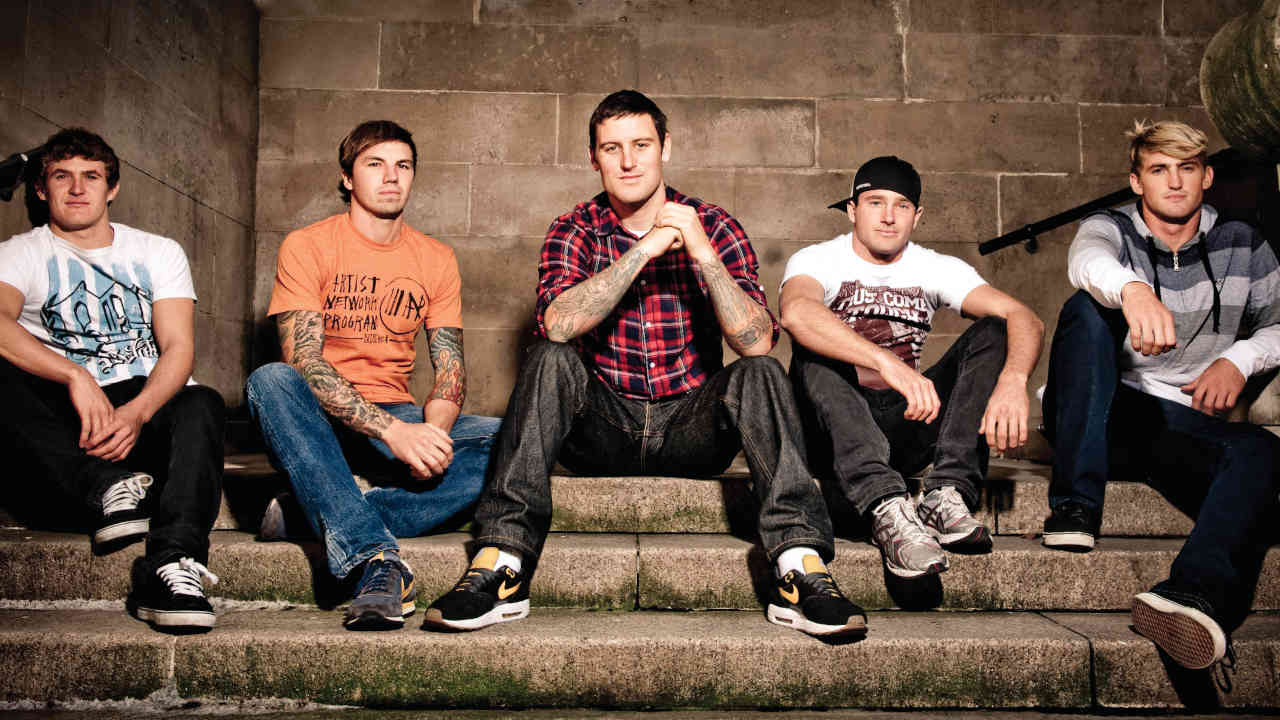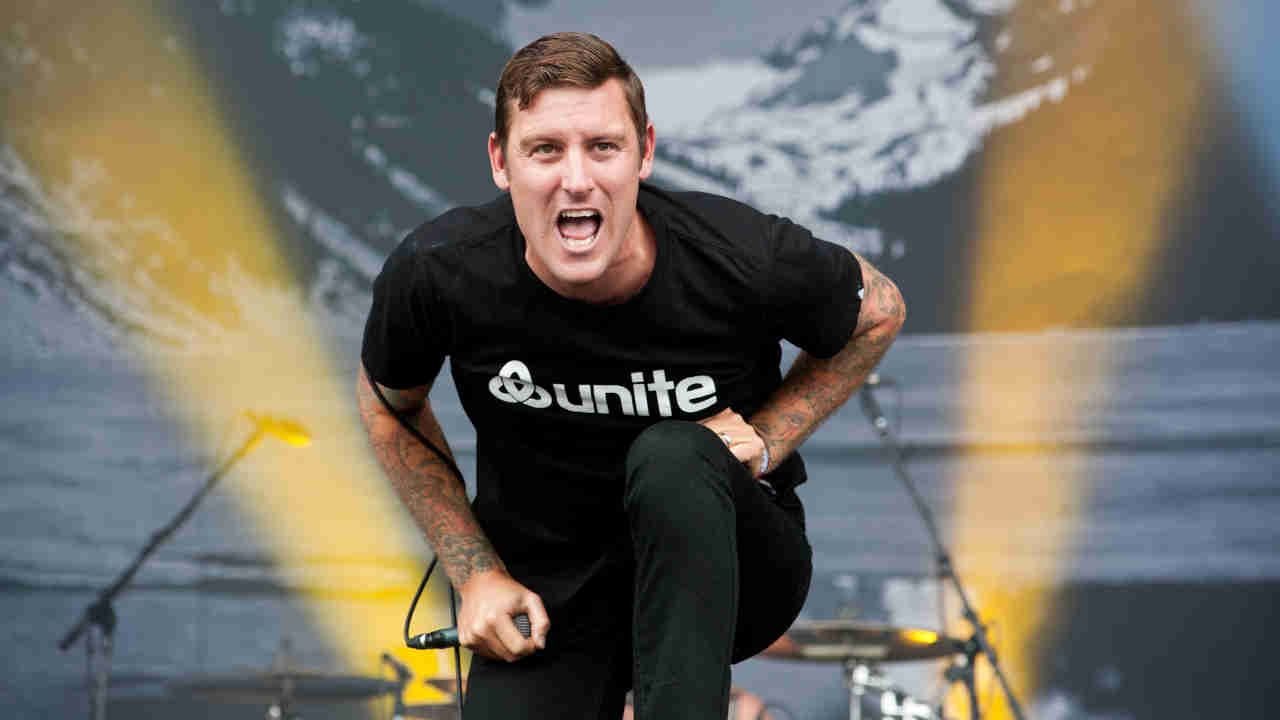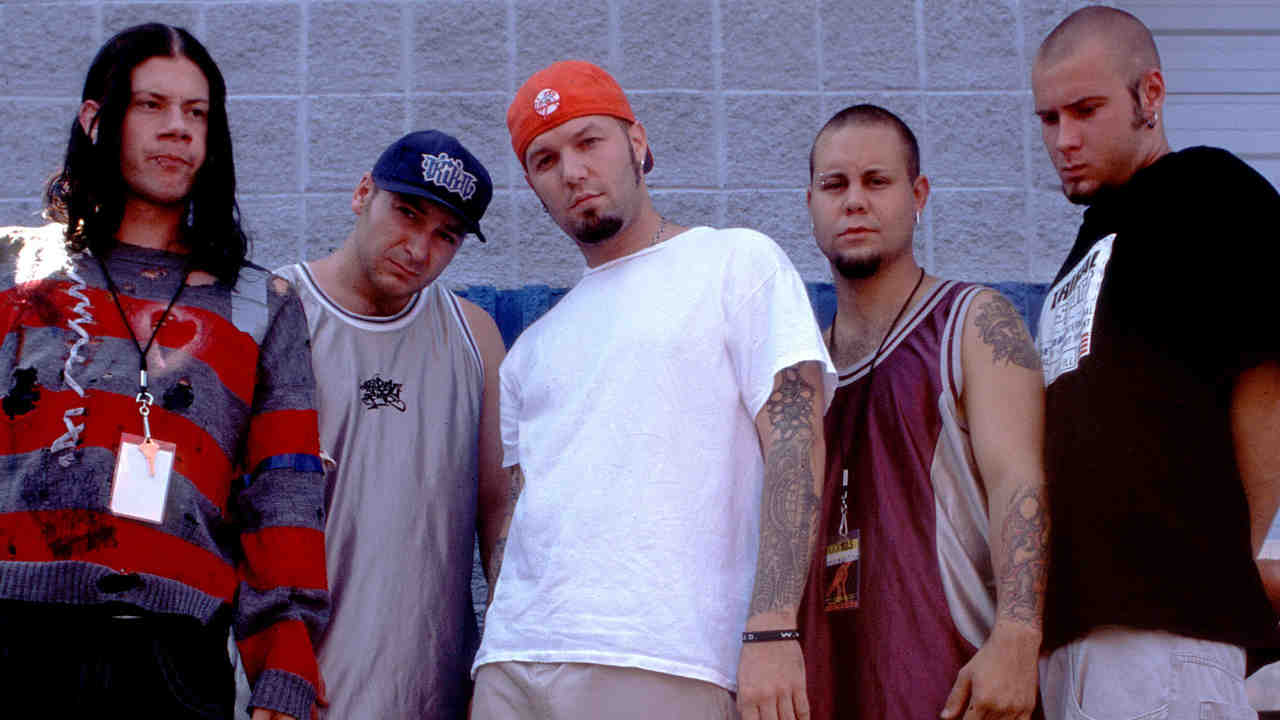“The masses can be controlled so easily by the few who have cash, and we’ve been on the receiving end our whole lives”: how Parkway Drive raged against the machine with the furious Deep Blue album
In 2010, Parkway Drive were at the vanguard of metallic hardcore – and their third album, Deep Blue, was the sound of a band at their furious best

Parkway Drive made waves in the late noughties metalcore scene with their first two albums, but it was 2010’s furious Deep Blue that marked them out as future festival headliners. But behind the sunshine of their native Byron Beach was darkness and despair in humanity, as frontman Winston McCall told Metal Hammer at the time.
Parkway Drive are not all that they seem. Yes their latest album, Deep Blue, is one of the best metal albums of 2010 – an uncompromisingly brutal album of hardcore-infused shape-throwing metal anthemia – and yes they look like Average Joe Aussie surf dudes. But beneath the affable laughter and the bouncing riffs lies a heart of genuine darkness – a misanthropic pessimism that verges on nihilistic despondency. To an outsider, Parkway’s hometown of Byron Bay appears to be a utopia: a small surfing community of unrivalled natural beauty. But just like the band it spawned, under the surface lies a dark reality of corruption, violence and poverty.
And all of this unexpected and insightful new information inadvertently comes tumbling out of frontman Winston McCall as we question the musical roots of the bandmembers and discuss what inspired the concept behind their latest opus.
“The initial idea of the band was to write music for people to just smash each other to,” explains Winston. “But with this one we wanted an album that was a lot more for the head than the feet. We wanted to write the music around the concept to give the whole thing a feel. The lyrics and themes drove the music too; we didn’t just lay the lyrics over the top of already-written songs.”
As we dig a little deeper, Winston reveals another layer, a deeper, darker layer of meaning to Deep Blue and what lies behind the smiles.
“The story is about a man who wakes up in a city and realises that everything he’s worked for and everything in his life is one big joke,” explains Winston as we follow the rabbit down the hole marked ‘dark conversation’. “He tries to find the humanity inside himself and he finds that in the bottom of the ocean.”
That’s all pretty dark dude, from meeting you over the years we had you pegged as a more upbeat kinda guy…
Sign up below to get the latest from Metal Hammer, plus exclusive special offers, direct to your inbox!
“That’s…” he pauses as if he’s pondering whether to quickly put the lid back on the can of worms he’s just opened for us. “That’s the other part of my personality. The Mr Hyde to my Dr Jekyll. The two parts make the other able to exist. I definitely couldn’t be the person you meet in real life if I couldn’t vent myself artistically and physically through the music we make. I can write these things down that impact on me so much and I can act like a gorilla on stage and scream to get it out. I’m a much more positive person since joining this band – I was really lost before… my mind was all over the place.”

Just look at the picture of them and maybe Google a picture of Byron Bay if you are unaware of the idyllic seaside destination, home to surfers and hippies alike. Now wonder what the frontman of this fast-rising metal band could possibly have to feel miserable about. Isn’t Byron Bay paradise?
“It is and it isn’t,” he says. “It’s not hard to play the role of hypocrite, because I write these songs but then come back to Byron… and that bugs me. It is a beautiful place, and more and more I see the ocean and the hills as what makes it beautiful, but the town itself is a very flawed community. It started off as a very redneck place, just farmers, but it’s since been bought up by rich movie stars and people from Sydney who can afford the real estate because being ‘the place to live’ drove the prices up. What you don’t hear about is that it has Australia’s highest unemployment rate, the hundreds of homeless people, the beatings and all the rapes. Growing up here has been interesting to see all that; you see how power works and what it does to people. And it’s all going on here in paradise. It’s more like Babylon!
“We always have our mates come and stay with us and they all say ‘It’s amazing! We want to live here!’ But I don’t know where to start with describing this town… I know it’s beautiful to look at, but you’ll never get a job here. In five months you’ll be sleeping on my couch because you can’t afford the rent or you’ll be dead because you got in a pub brawl. It’s ridiculous.”
Don’t think that Deep Blue is some local navel-gazing operation. To assume that travelling the world with your mates in a metal band would make you happy might be the presumption of superficial analysis. Knowing the misery of humanity reminds you that ignorance is bliss.
“It’s strange when we’re taken away from this place we think of as paradise to see the rest of the world from inside the band. The more I travel the more I see different societies and the more misery I see. Humans – mainly in Western society – live in a really odd and incorrect manner. The human body and the human mind isn’t used to the luxury it lives in now: sitting in front of a box full of lights for two weeks, while some people literally starve to death.
“Human existence has polarised: deep in human history it seems that plagues or bad things happened across peoples, but now it only happens to the poor or the disadvantaged. There are the haves and the have- nots, and it’s getting worse. And we have these political systems in place designed to maintain the status quo,” he laughs nervously as if the outburst was a little more than he bargained for.
Luckily he’s talking to Hammer, and we’re happy to rant about the politics/religion/the impending downfall of humanity etc. But it’s not every person Hammer interviews who can launch into an erudite diatribe of astute observational misanthropy – even in a scene that supposedly thrives on negativity.
“I could rant about this for days,” he says smiling before barrelling on again. “The human aspect of humanity is being conditioned out of humans by the systems in place; we call it education and work, and we’re told that money is the be all and end all – like it’s all you need to be happy and survive.”
It’s reassuring that a band who don’t look out of place in quicksilver board shorts share the bleak outlook of our most beloved metal bands from Sabbath to Metallica.
As Winston admits, thinking about these things is enough to drive a man to nihilism. The rich should help the poor. Or should they? What duty does one man have to help another if he’s thousands of miles away? Does it make any difference if they’re on your doorstep? We’re always being told to save the planet and look after the earth and its inhabitants… but what for? So that more humans can exploit more animals and humans and land for selfish gains? If the world is a better place for our children, so what? If life is marginalised as suggested by dystopian movies like 2012 or The Day After Tomorrow, then it appears the rich and the greedy will get all the good seats anyway – so why leave the world in good nick for those fuckers? Whether we cause it or not the planet’s temperature will probably fluctuate by a fraction and we’ll be blown effortlessly out like a cheap birthday candle. Humans will doubtless become another miniscule footnote in the historical document of our planet as an epilogue to a chapter on dinosaurs.
“It’s a very perplexing situation we’re in nowadays. It makes my mind turn and I feel guilty for the way I live in this world, there’s something in me that also says, ‘Is this how we should be living?’, but I still want to have all the things I have. Is this the best way that humans can live? We’re the only animal capable of genocide. There are some great individuals but… I don’t hold humans in a very positive light,” he says, laughing at the irony of his incongruous good humour and misanthropy. “It was The Matrix that said it best: humanity is a virus. It rings so true, which is really… sad.”
There was a time when humans didn’t need iPods, cool clothes or fast cars. And we didn’t destroy the habitat we lived in to survive or acquire the few pleasures we had to the extent that man does today. Westerners particularly have harnessed the power of technology but – it seems – only to keep other humans passive while taking their money and power and destroying their planet.”
It’s bleak, but this is real life and there is no Hollywood ending. The elves don’t kill the orcs and get their homeland back. We’re all still fucked…
“It’s so hard to change anything,” acquiesces Winston, shaking his head. “It’s easy to change yourself, but when you do change yourself you just realise how you can’t change anything bigger than that. We’ve been involved in community protests and other projects here and it’s done very little.” He sighs in defeat. “Humans… the masses can be controlled so easily by the few who have cash and we’ve been on the receiving end of this our whole lives. So many people can see that we’re being conditioned but no one can change it. The people who stand up for what’s right get assassinated; not mortally but by the culture, they get marginalised or cast out. The systems are self-sustaining and it’ll take something monumental to change it, and I doubt I will see it in my lifetime.”
It is a dark place to be. Like the curse of Cassandra: you can see the future but no one believes you. Once you’re faced with knowing that you are powerless to change anything even though you’d like to, how do you live?
“Exactly,” he says. “That’s what I write about.”
No wonder the album and live shows are so intense.
So humanity is going down the toilet and if your kids have a planet to live on they’ll be the slaves of corporate pirates, but hey, at least we have Parkway Drive, a band whose live show is like a barbarian invasion and whose album is like a collision of Lamb Of God, Hatebreed and Mastodon.
And of course, Parkway have reasons to be cheerful: they’ve gone from an obscure also-ran metalcore band from a backwater within a backwater, to national heroes (playing to 5,000 people a night) and international ambassadors (becoming favourites of Warped Tour) within five years. In dark times like these, thank God for the life-affirming pessimism of Parkway Drive.
Originally published in Metal Hammer issue 211


